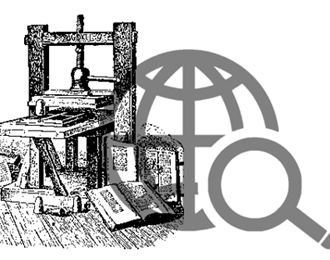Never was the Bible so accessible! (2)
02-06-2025 - Posted by Geert-JanOriginally posted on November 04, 2022 - by Andre Piet
As the first reason why the Bible is so accessible today, I pointed to the separation of church and state. Since roughly the 18th century, tolerance toward minority groups has greatly increased in the Western world. As a result, individuals and groups who wanted to study and proclaim the truth of Scripture outside the church institution were given full political freedom to do so.
printing press
In this follow-up blog, I would like to highlight a second, technological reason why the Bible is more accessible today than ever before. To properly understand this development, we must go back to around 1450 AD, when the printing press was invented by Johannes Gutenberg in Mainz. He was the first person to succeed in mechanically reproducing texts using a press. Until then, books were copied by hand, which was of course very time-consuming and therefore expensive. Access to reading and studying the Bible for oneself was a privilege reserved for very few. Gutenberg sparked a media revolution, and the very first thing he printed was the famous Gutenberg Bible. It is easy to see how this development became a powerful driving force behind the Reformation (in 1517 AD), with its emphasis on sola scriptura – “scripture alone.” But many other (study) books also became much more accessible through this process, and universities each established their own libraries. In this way, “the church” gradually lost its monopoly on access to information. Without the printing press, historical developments such as the Reformation, the scientific revolution of the 17th century, and the Enlightenment would not have occurred—or at least, not in the same way. Even the earlier-mentioned separation of church and state, as a fruit of the Enlightenment, is not unrelated to the invention of the printing press.
computers and the internet
The availability of books in general, and of the Bible in particular (who nowadays doesn’t have one or more Bibles at home?), has given an enormous boost to Bible study. For from then on, this study would no longer be reserved for a privileged few, but in principle for everyone. But that development did not stop there. With the rise of the personal computer (PCs) and later the internet, access to information became vastly more convenient. Expensive encyclopedias and reference works largely became obsolete, since everyone could now retrieve all necessary information at home on their computer. Even more: with the arrival of wireless internet and smartphones, we now have that information available at any given location!
searching & finding simplified
Not only is information as a whole now directly available, but finding specific information has also become impressively easier. To limit myself to Bible study: for those who want to know what is written in the original text of a specific passage, numerous Bible programs are available. Also interlinears, online and even free of charge. One can see which Hebrew or Greek words are used, while with just a few clicks, dictionaries and lexicons provide insight into their meaning and origin. Concordances can immediately show how words are used and how different translations handle them. Certainly, all this information could also be found fifty years ago using reference works, but it required much more time. A search that then took an hour can now be completed in roughly five minutes or less. In short, a tremendous time-saver! Of course, information is of a different order than wisdom and insight. Computers or the internet are simply not capable of giving a person “enlightened eyes of the heart.” Yet this does not change the fact that the truth of the Word has never been so near (deuteronomy 30:12–14).
the reach of the message
This “near you is the word” also applies to the spreading of the word. I often reflect on the fact that proclaiming the message as I may do through this website is technically incomparable to a hundred years ago. Or even fifty years ago—and even twenty-five! Back then, I might have been able to run a magazine or publish small booklets. But that would have required far more time, would have been much more costly, and would not even come close to the reach that the GB site now has. All articles, presentations, and addresses are directly, globally, and freely available with audio and video! These are unprecedented possibilities never before seen in history.
what remains: the word!
In the second letter to timothy, Paul entrusts his spiritual testament to his co-worker timothy. He warns of developments in christendom and foretells in detail how the “last days” will become perilous times (2 timothy 3). Christendom as a whole would no longer tolerate sound teaching (2 timothy 4). It sharply describes the current situation. But one thing would stand firm: the sacred scriptures. Decline everywhere—yes, exactly as foretold. And with “a form of devoutness,” many turn away from the truth. And yet… the scriptures shine more gloriously than ever. Their light shines—always, everywhere. And the one who seeks, finds! In a sense, that has always been true, but no one can deny that, objectively and historically, the scriptures have never been as accessible as they are in our day.

 English Blog
English Blog